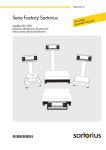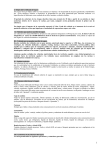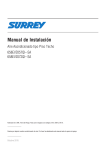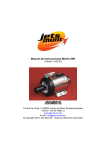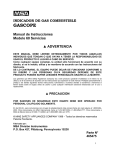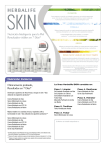Download Homax 4670 Instructions / Assembly
Transcript
Professional Texture Gun & Hopper Operating Instructions Pistola de textura con tolva de uso profesional Instrucciones de manejo Homax Products, Inc. P.O. Box 5643 Bellingham, WA 98227 800-729-9029 www.homaxproducts.com Professional Texture Gun & Hopper Manufactured in China for Homax Specifications Capacity 1.25 Gallons (5L) Air Inlet Recommended PSI 1/4” NPS (Male) 50 - 70 PSI Hopper Dimensions 10” x 9-7/8” x 9” Nozzle Sizes .177” (4.5mm), .236” (6mm), .314” (8mm) Top Opening 7-7/8” x 4-3/16” CFM Required 4-6 CFM Funnel Opening 1-5/8” Save This Manual Retain this manual for the safety warnings and precautions, assembly instructions, operating and maintenance procedures, parts list and diagram. Safety Warnings and Precautions WARNING: When using tool, basic safety precautions should always be followed to reduce risk of personal injury and damage to equipment. READ INSTRUCTIONS BEFORE USE! 1. Keep work area clean. Cluttered areas invite injuries. 2. Observe work area conditions. Do not use machines or power tools in damp or wet locations. Don’t expose to rain. Keep work area well lit. Do not use electric power tools in the presence of flammable gases or liquids. 3. Keep children away. Children should not be allowed in the work area. Do not let them handle machines, tools, or extension cords. 4. Store idle equipment. When not in use, tools should be stored in a dry location to inhibit rust. Always lock up tools and keep out of reach of children. 5. Do not force tool. Use tool as intended only. Do not use inappropriate attachments in an attempt to exceed the tool capacity. 6. Use the right tool for the job. Do not attempt to force smaller attachments to do the work of a larger industrial tool. There are certain applications for which this tool was designed. Do not modify this tool and do not use this tool for a purpose for which it was not intended. 7. Dress properly. Do not wear loose clothing or jewelry as they can be caught in moving parts. Protective, electrically non-conductive clothes and non-skid footwear are recommended when working. Wear restrictive hair covering to contain long hair. 8. Use eye and breathing protection. Always wear ANSI approved impact safety goggles. Wear an ANSI approved respirator when spraying. 1 9. Maintain tools with care. Keep tools clean for better and safer performance. Follow instructions for lubricating and changing accessories. Inspect tool cords and hoses periodically and, if damaged, have them repaired by an authorized technician. The handles must be kept clean, dry, and free from oil and grease at all times. 10. Disconnect power. When not in use disconnect from compressor. 11. Avoid unintentional starting. Do not carry any tool with your finger on the trigger, whether it is plugged in or not. 12. Stay alert. Watch what you are doing, use common sense. Do not operate any tool when you are tired. 13. Do not operate tool if under the influence of alcohol or drugs. Read warning labels on prescriptions to determine if your judgment or reflexes are impaired while taking drugs. If there is any doubt, do not operate the tool. 14. Check for damaged parts. Before using any tool, any part that appears damaged should be carefully checked to determine that it will operate properly and perform its intended function. Check for alignment and binding of moving parts; any broken parts or mounting fixtures; and any other condition that may affect proper operation. Any part that is damaged should be properly repaired or replaced by a qualified technician. Do not use the tool if any switch does not turn On and Off properly. 15. Guard against electric shock. Prevent body contact with grounded surfaces such as pipes, radiators, ranges, and refrigerator enclosures. 16. Replacement parts and accessories. When servicing, use only identical replacement parts. Use of any other parts will void any warranty. 17. Use proper size and type extension cord. If an extension cord is required, it must be of the proper size and type to supply the correct current to the air compressor without heating up. Otherwise, the extension cord could melt and catch fire, or cause electrical damage to the air compressor. Check air compressor manual. 18. Keep aware of air hoses. Be careful not to trip over air hoses while working. Check air connections periodically. 19. Do not operate Spray Gun near open flames, pilot lights, heaters, or any other heat source. Make sure you have adequate ventilation. Most solvents and paints are extremely flammable, especially when sprayed. Never smoke cigarettes in the same room you are working in. 20. Read labels on cleaning solvents and paint coatings. Chlorinated solvents such as 111-Trichloroethane and Methylene Chloride (also known as methyl-chloride) can chemically react with aluminum and may explode. Many paint sprayers contain aluminum. Contact solvent manufacturer or paint supplier if you are in doubt. 21. Paints and solvents may be harmful or fatal if swallowed or inhaled. Always use a respirator that is appropriate for type of paint/solvent being used when spraying. Avoid prolonged skin contact with solvents or paints as they will irritate skin. After contact, immediately wash off exposed are with hot, soapy water. 22. Check all Spray Gun seals and air connection. Before use, make sure the Hopper (#17) is fully tightened to the Body (#3). Make sure the air hose is securely fastened to the Air Inlet (#13). 23. Read and understand all warnings and instructions provided in the instruction manual of the air compressor being used. 24. Never point Texture Gun at people or animals. 2 NOTE: Performance of the compressor (if powered by line voltage) may vary depending on variations in local line voltage. Extension cord usage may also affect tool performance. WARNING: The warnings, cautions, and instructions discussed in this instruction manual cannot cover all possible conditions and situations that may occur. It must be understood by the operator that common sense and caution are factors which cannot be built into this product, but must be supplied by the operator. Additionally, read all of the warnings and instructions in the instruction manual of the air compressor you will be using. WARNING: This product contains or, when used, produces a chemical known to the State of California to cause cancer and birth defects or other reproductive harm. (California Health & Safety Code 25249, et seq.) Unpacking When unpacking, check to make sure the parts listed on page 6 are included. ASSEMBLY Refer to Assembly Drawing (page 7). 1. To attach the Hopper (#17), use the Clamp (#18) to connect it to the Body (#3). 2. Wrap the threaded end of the Air Inlet (#13) with pipe thread seal tape (not included), and attach the ¼˝ “Quick-Connect” Compressor Line Connector (#19). (Optional) The Air Shut-Off Valve (#20) can be added between the Air Inlet (#13) *and the ¼˝ “Quick-Connect” Compressor Line Connector (#19) if desired. Wrapping the threaded end of the Air Shut-Off Valve (#20) with pipe thread seal tape (not included) is recommended. 3. Attach desired Nozzle Tip (#2a, #2b, #2c) inside the Retaining Ring (#1) and screw on to the threads of the Texture Gun. PATTERNS Light - Medium Orange Peel Heavy Orange Peel - Splatter & Knockdown Acoustic “Popcorn” Ceiling Texture #2a - .177” (4.5mm) opening #2b - .236” (6mm) opening #2c - .314” (8mm) opening OPERATION Warning! Never allow the Texture Gun and Hopper (#17) to lay on it’s side when the Hopper (#17) is full of material. 3 PREPARATION 1. For best results prepare the provided ¼˝ “Quick-Connect” Compressor Line Connector (#19) to connect to the Air inlet (#13). First, wrap the threaded end of the Air inlet (#13) with pipe thread seal tape and attach the ¼˝ “Quick-Connect” Compressor Line Connector (#19). (Optional) The Air Shut-Off Valve (#20) can be added between the Air Inlet (#13) and the ¼˝ “Quick-Connect” Compressor Line Connector (#19) if desired. Wrapping the threaded end of the Air Shut-Off Valve (#20) with pipe thread seal tape (not included) is recommended. 2. Attach air source hose to the Air Inlet (#13) or the ¼˝ “Quick-Connect” Compressor Line Connector (#19) (Recommended) on the Texture Gun. 3. Set the pressure to 50-70 PSI. DO NOT EXCEED the recommended air pressure of 70 PSI. 4. Check air connection for leaks. 5. Turn off the compressor and disconnect the air source hose in preparation to load material. * Note: It is normal for air to continuously flow through the spray gun while connected to the air supply. Material will not flow unless the trigger in depressed. If you wish to stop the air flow, turn the Ball Valve handle 90 degrees or disconnect the air hose. APPLICATION 1. Mix material in a separate container. Average consistency should be similar to pancake batter. Material may be thicker or thinner depending on desired texture/pattern. 2. Attach the Hopper (#17) by tightening the Clamp (#18). Fill with no more than 1.25 Gallons (5L) of material. 3. Connect the air hose to the Air Inlet (#13) and set the pressure to 50-70 PSI. Do not exceed 70 PSI. 4. Squeeze the Trigger (#14) to test pattern. 5. Spray from a distance of approximately 12” to 24”, maintaining distance as you spray. 6. When you finish spraying, release the Trigger (#14), and disconnect the air hose. 7. Empty the Hopper (#17). DO NOT store the Hopper (#17) filled with material. Note: It is recommended that you test the Texture Gun on scrap material, to become familiar with the available adjustments, prior to use. ADJUSTMENTS 1. You can regulate the fluid flow with the Texture Volume Adjustment Knob (#8). Slowly turn the Texture Volume Adjustment Knob (#8) and fine tune it to meet your needs. You may also adjust the pressure with the air compressor. Make sure you do not exceed the recommended 70 PSI. 2. You can change Nozzle Tips (#2a, #2b, #2c) for different texture patterns. Disconnect the air hose before changing nozzles. Test Nozzle Tips (#2a, #2b, #2c) on scrap material to match desired pattern. 4 Troubleshooting Problem 1: Cause: Solution: Heavy Top/Bottom, or Right/Left Pattern Partially plugged Nozzle Tip Remove Nozzle Tip and clean Problem 2: Cause: Solution: Heavy Texture in Center Too much material Reduce texture volume with Texture Volume Adjustment Knob (#8) Cause: Solution: Material too thick Thin out material Problem 3: Cause: Solution: Split Spray Pattern Pressure too high Reduce air pressure at regulator Cause: Solution: Not enough texture material Increase texture volume with Texture Volume Adjustment Knob (#8) Problem 4: Cause: Solution: Jerky or Fluttering Spray Insufficient texture material Add more texture to Hopper (#17) Cause: Solution: Gun and Hopper (#17) tipped at an excessive angle Correct angle Maintenance CLEANING Warning! Do not use paint strippers on this unit as they will damage the aluminum. 1. Empty and remove Hopper (#17). 2. Rinse under running water until texture is removed. 3. Wipe Hopper (#17) dry. 4. Remove Retaining Ring (#1) and Nozzle Tip (#2a, #2b, #2c) rinse under running water until texture material is removed. A soft bristled toothbrush can be used to clean threads on Retaining Ring (#1). 5. Wipe Retaining Ring (#1) and Nozzle Tip (#2a, #2b, #2c) dry with lint free cloth. 6. Rinse Texture Gun Body (#3) under running water until texture is removed. A toothbrush can be inserted through top and front opening to clean. 7. Wipe Texture Gun Body (#3) dry with lint free cloth. Note: Always dispose of texture materials properly. Consult the local hazardous waste authority for proper disposal procedures and sites. 5 Parts List Part No. 1 2a 2b 2c 3 4 5 6 7 8 8a 9 10 11 11a 12 13 13a 14 15 16 17 18 19 20 Description Retaining Ring Nozzle .177” (4.5mm) Nozzle .236” (6mm) Nozzle .314” (8mm) Body O-ring Fitting O-ring O-ring Texture Volume Adjustment Knob O-ring Needle Shaft O-ring Assembly Set O-ring Clip Ring Air Inlet O-ring Trigger Pin E-ring Hopper Clamp ¼˝ “Quick-Connect” Compressor Line Connector Air Shut-Off Valve Qty. 1 1 1 1 1 1 1 1 1 1 1 1 2 1 1 1 1 1 1 1 1 1 1 1 1 PLEASE READ THE FOLLOWING CAREFULLY THE MANUFACTURER AND/OR DISTRIBUTOR HAS PROVIDED THE PARTS DIAGRAM IN THIS MANUAL AS A REFERENCE TOOL ONLY. NEITHER THE MANUFACTURER NOR DISTRIBUTOR MAKES ANY REPRESENTATION OR WARRANTY OF ANY KIND TO THE BUYER THAT HE OR SHE IS QUALIFIED TO REPLACE ANY PARTS OF THE PRODUCT. IN FACT, THE MANUFACTURER AND/OR DISTRIBUTOR EXPRESSLY STATES THAT ALL REPAIRS AND PART REPLACEMENTS SHOULD BE UNDERTAKEN BY CERTIFIED AND LICENSED TECHNICIANS AND NOT BY THE BUYER. THE BUYER ASSUMES ALL RISK AND LIABILITY ARISING OUT OF HIS OR HER REPAIRS TO THE ORIGINAL PRODUCT OR REPLACEMENT PARTS THERETO, OR ARISING OUT OF HIS OR HER INSTALLATION OR REPLACEMENT PARTS THERETO. 6 Assembly Drawing / Gráfico de Ensamblaje 7 Pistola de Textura con Tolva de uso Profesional Fabricado en China para Homax Especificaciones Capacidad 1.25 galones (5L) Toma de aire PSI recomendado NPS de 1/4” (macho) 50 a 70 PSI Dimensiones de la tolva Tamaños de las boquillas Abertura superior 10” x 9-7/8” x 9” CFM requeridos 4 a 6 CFM Abertura del embudo 1-5/8” 0.177” (4.5 mm), 0.236” (6 mm), 0.314” (8 mm) 7-7/8” x 4-3/16” Guarde este manual Conserve este manual para consultar las advertencias y precauciones de seguridad, las instrucciones de montaje, los procedimientos de mantenimiento y funcionamiento, la lista de piezas y el diagrama de montaje. Advertencias y precauciones de seguridad ADVERTENCIA: Al usar esta herramienta, siempre se deben seguir las precauciones de seguridad básicas para reducir el riesgo de lesiones personales y daño al equipo. ¡ANTES DE USAR LA HERRAMIENTA, LEA LAS INSTRUCCIONES! 1. Mantenga limpia el área de trabajo. El desorden facilita la ocurrencia de lesiones. 2. Preste atención a las condiciones del área de trabajo. No use máquinas ni herramientas eléctricas en lugares húmedos o mojados. No trabaje bajo la lluvia. Mantenga el área bien iluminada. No use herramientas eléctricas en presencia de líquidos o gases inflamables. 3. Mantenga a los niños alejados. No permita que los niños permanezcan en el área de trabajo. No deje que manipulen máquinas, herramientas ni cables de extensión. 4. Guarde el equipo que no use. Cuando las herramientas no se usan, deben guardarse en un lugar seco para evitar que se oxiden. Guárdelas siempre bajo llave y fuera del alcance de los niños. 5. No fuerce las herramientas. Úselas para el fin para el que fueron diseñadas solamente. No use aditamentos inadecuados con el objeto de extralimitar la capacidad de la herramienta. 6. Use la herramienta adecuada para el trabajo. No intente forzar aditamentos más pequeños para hacer el trabajo de una herramienta industrial más grande. Esta herramienta fue diseñada para determinadas aplicaciones. No la modifique ni la use para un propósito distinto del fin para el que fue diseñada. 7. Use ropa adecuada. No use ropa holgada ni alhajas, ya que pueden quedar atrapadas entre las piezas móviles. Al trabajar, se recomienda el uso de zapatos antideslizantes y ropa protectora que no favorezca la conducción eléctrica. Para contener el cabello largo, use alguna clase de gorro restrictivo. 8 8. Use protección respiratoria y visual. Use siempre gafas protectoras contra impactos aprobadas por ANSI. Al rociar, use un respirador aprobado por ANSI. 9. Cuide las herramientas. Mantenga las herramientas limpias en pos de un desempeño más seguro y superior. Siga las instrucciones para lubricar y cambiar los accesorios. Examine periódicamente las mangueras y los cables de la herramienta y, si presentan daños, solicite a un técnico autorizado que los repare. Los mangos deben estar limpios, secos y libres de grasa y aceite en todo momento. 10. Desconecte la energía. Cuando no use la herramienta, desconéctela del compresor. 11. Evite el arranque accidental. No transporte ninguna herramienta con el dedo en el disparador, ya sea que esté enchufada o no. 12. Permanezca alerta. Preste atención a lo que hace y use el sentido común. No opere ninguna herramienta si está cansado. 13. No opere ninguna herramienta bajo el efecto de alcohol o medicamentos. Lea las etiquetas de advertencia de las recetas para determinar si los medicamentos que toma afectarán su juicio o sus reflejos. En caso de duda, no opere la herramienta. 14. Verifique si existen piezas rotas. Antes de usar cualquier herramienta, examine detenidamente cualquier pieza que aparentemente esté dañada para determinar si funcionará correctamente y desempeñará la función correspondiente. Verifique la alineación y la unión de las piezas móviles, si existen piezas y accesorios de montaje rotos, y cualquier otra condición que pueda afectar el correcto funcionamiento. Cualquier pieza dañada deberá ser adecuadamente reemplazada o reparada por un técnico calificado. No use la herramienta si algún interruptor no enciende o apaga correctamente. 15. Protéjase contra los shocks eléctricos. Evite el contacto del cuerpo con las superficies puestas a tierra, como las tuberías, los radiadores, las cocinas y los espacios destinados al refrigerador. 16. Accesorios y piezas de repuesto. Al hacer los mantenimientos, use solamente piezas de repuesto idénticas. El uso de cualquier otra pieza anulará la garantía. 17. Use el cable de extensión del tipo y el tamaño adecuados. Si se requiere el uso de un cable de extensión, debe ser un cable del tipo y el tamaño adecuados para suministrar la corriente correcta al compresor de aire sin causar calentamiento. De lo contario, el cable de extensión se derretirá e incendiará, o el compresor de aire se dañará. Consulte el manual del compresor de aire. 18. Preste atención a las mangueras de aire. Tenga cuidado de no tropezar con éstas al trabajar. Verifique las conexiones periódicamente. 19. No opere la pistola rociadora cerca de llamas, pilotos, calentadores o cualquier otra fuente de calor. Asegúrese de que la ventilación sea adecuada. La mayoría de los solventes y las pinturas son extremadamente inflamables, en especial al rociarlos. Nunca fume cigarrillos en la misma habitación en la que trabaja. 20. Lea las etiquetas de los solventes de limpieza y los recubrimientos de pintura. Los solventes clorinados, como el tricloroetano 111 y el cloruro de metileno (también conocido como cloruro de metilo), pueden reaccionar químicamente con el aluminio y pueden explotar. Muchos rociadores de pintura contienen aluminio. En caso de duda, póngase en contacto con el proveedor de la pintura o el fabricante del solvente. 21. La ingestión o la inhalación de pinturas y solventes puede resultar tóxica o mortal. Use siempre un respirador que sea apropiado para el tipo de pintura o solvente que se está rociando. Evite el contacto prolongado de la piel con solventes o pinturas, puesto que pueden irritarla. Tras el contacto, lave de inmediato las zonas expuestas con agua jabonosa caliente. 9 22. Examine todas las conexiones y sellos de la pistola rociadora. Antes de usarla, asegúrese de que la Tolva (#17) esté ajustada por completo al Cuerpo (#3). Corrobore que la manguera de aire esté sujeta con firmeza a la Toma de Aire (#13). 23. Lea y entienda todas las advertencias e instrucciones que se suministran en el manual de instrucciones del compresor de aire que se use. 24. Nunca apunte la pistola de textura hacia personas o animales. NOTA: El desempeño del compresor (si se activa mediante tensión de línea) puede variar según las fluctuaciones de la tensión de la línea local. El uso de un cable de extensión también puede afectar el desempeño de la herramienta. ADVERTENCIA: Las advertencias, las precauciones y las instrucciones que se detallan en este manual de instrucciones no cubren todas las condiciones y situaciones posibles. El operador debe entender que el sentido común y la precaución son factores que no pueden ser incorporados a este producto, sino que debe ejercerlos el operador. Además, lea todas las advertencias y las instrucciones en el manual de instrucciones del compresor de aire que usará. ADVERTENCIA: Según el estado de California, este producto contiene o, cuando se usa, produce una sustancia química causante de cáncer, defectos de nacimiento u otros daños a la salud reproductiva. (Código de Salud y Seguridad de California 25249, et seq.) Desembalaje Al desembalar, asegúrese de que las piezas detalladas en la página 13 estén incluidas. MONTAJE Consulte el diagrama de montaje (página 7). 1. Para acoplar la Tolva (#17), use la Abrazadera (#18) para conectarla al Cuerpo (#3). 2. Envuelva el extremo roscado de Toma de Aire (#13) con cinta selladora de roscas (no incluida) y acople el “Rápido-Conecta” la Línea Conector del Compresor del ¼˝ (#19). la Válvula de Cierre del Aire (#20) se puede añadir entre la Toma de Aire (#13) *y (Opcional) el “Rápido-Conecta” la Línea Conector del Compresor del ¼˝ (#19) si está deseada. Se recomienda el embalaje del extremo roscado de la Válvula de Cierre del Aire (#20). 3. Coloque la Boquilla (#2a, #2b, #2c) deseada dentro del Anillo de Retención (#1) y enrósquela en la pistola de textura. PATRONES Piel de naranja de textura ligera a media Salpicado/Acabado planchado Textura acústica para cielos rasos con textura de tirol Abertura #2a de 0.177” (4.5 mm) Abertura #2b de 0,236” (6 mm) Abertura #2c de 0,314” (8 mm) 10 FUNCIONAMIENTO ¡Advertencia! Nunca deje la pistola de textura con Tolva (#17) colocada sobre un lado cuando la Tolva (#17) esté llena de material. PREPARACIÓN 1. Para obtener mejores resultados, prepare un Rápido-Conecta” la Línea Conector del Compresor del ¼˝ (#19) para acoplarlo a la Toma de Aire (#13). Primero, envuelva el Rápido-Conecta” la Línea Conector del Compresor del ¼˝ (#19) con cinta selladora para roscas antes de conectarlo a la manguera de una fuente de aire (no incluida). (Opcional) la Válvula de Cierre del Aire (#20) se puede añadir entre la Toma de Aire (#13) y el “Rápido-Conecta” la Línea Conector del Compresor del ¼˝ (#19) si está deseada. Se recomienda el embalaje del extremo roscado de la Válvula de Cerre del Aire (#20). 2. Acople la manguera de aire a la Toma de Aire (#13) o Rápido-Conecta” la Línea Conector del Compresor del ¼˝ (#19) de la pistola de textura. 3. Configure la presión en 50-70 PSI. NO SUPERE la presión de aire recomendada de 70 PSI. 4. Examine las conexiones en busca de pérdidas. 5. Apague el compresor y desconecte la manguera de la fuente de aire cuando se prepara para cargar el material. * Nota: Es normal que siga fluyendo aire en forma continua a través de la pistola rociadora mientras ésta esté conectada a un suministro de aire. El material no fluirá a menos que el disparador esté presionado. Si desea interrumpir el flujo de aire, gire 90 grados el mango de la válvula de bola o desconecte la manguera de aire. APLICACIÓN: 1. Mezcle el material en un recipiente. La consistencia promedio debe ser similar a la mezcla para panqueques. El material puede ser más espeso o más ligero, según el patrón o la textura deseados. 2. Coloque la Tolva (#17) ajustando la Abrazadera (#18). Llénela con 1.25 galones (5L) de material como máximo. 3. Conecte la manguera de aire a la Toma de Aire (#13) y configure la presión en 50-70 PSI. No supere los 70 PSI. 4. Apriete el Disparador (#14) para probar el patrón. 5. Rocié a una distancia de aproximadamente 12” a 24” (30 cm a 60 cm). 6. Al terminar de rociar, suelte el Disparador (#14) y desconecte la manguera de aire. 7. Vacíe la Tolva (#17). NO la guarde con material. Nota: Ante de usarla, le recomendamos que pruebe la pistola de textura en algún material de descarte para que se familiarice con los ajustes disponibles. ADJUSTES 1. Puede regular el flujo del fluido con la Botón del Ajuste del Volumen de la Textura (#8). Gírela despacio para ajustar la Botón del Ajuste del Volumen de la Textura (#8) según sus necesidades. También puede ajustar la presión con el compresor de aire. Asegúrese de no superar la presión recomendada de 70 PSI. 2. Puede cambiar las Boquillas (#2a, #2b, #2c) para lograr patrones diferentes. Antes de cambiar las boquillas, desconecte la manguera de aire. Pruebe las Boquillas (#2a, #2b, #2c) en algún material de descarte para determinar el patrón deseado. 11 Resolución de problemas Problema 1: Parte superior/inferior densa o patrón hacia la izquierda/derecha Causa: Boquilla parcialmente obstruida Solutión: Quite la boquilla y límpiela Problema 2:Textura densa en el centro Causa: Demasiado material Solutión: Disminuya el flujo del fluido con la Botón del Ajuste del Volumen de la Textura (#8) Causa: Solutión: Material muy espeso Diluya el material Problema 3:Patrón de rociado dividido Causa: Presión demasiado alta Solutión: Disminuya la presión de aire con el regulador Causa: Solutión: Material de textura insuficiente Aumente el flujo del fluido con la Botón del Ajuste del Volumen de la Textura (#8) Problema 4:Rociado ondulado o entrecortado Causa: Material de textura insuficiente Solutión: Agregue más material de textura a la Tolva (#17) Causa: Solutión: La pistola con la Tolva (#17) gotea si se coloca en un ángulo pronunciado Corrija el ángulo Mantenimiento LIMPIEZA ¡Advertencia! No use decapantes de pintura con esta unidad, ya que dañarán el aluminio. 1. 2. 3. 4. Vacíe y quite la tolva. Lávela con agua corriente hasta eliminar todo el material de textura. Séquela con un paño seco que no genere pelusas. Quite el Anillo de Retención (#1) y la Boquilla (#2a, #2b, #2c) y lávelos con agua corriente hasta eliminar todo el material de textura. Para limpiar las roscas del Anillo de Retención (#1), se puede usar un cepillo de dientes de cerdas suaves. 5. Seque el Anillo de Retención (#1) y la Boquilla (#2a, #2b, #2c) con un paño seco que no genere pelusas. 6. Lave el Cuerpo (#3) de la pistola de textura con agua corriente hasta eliminar todo el material de textura. Para limpiarlo, puede insertar un cepillo de dientes a través de la abertura delantera superior. 7. Seque el Cuerpo (#3) de la pistola de textura con un paño seco que no genere pelusas. Nota: Deseche siempre los materiales de textura de manera correcta. Consulte a la autoridad local encargada de la eliminación de desechos peligrosos para conocer los lugares y los procedimientos adecuados de eliminación. 12 Parts List Pieza n.º 1 2a 2b 2c 3 4 5 6 7 8 8a 9 10 11 11a 12 13 13a 14 15 16 17 18 19 20 Descripción Anillo de Retención Boquilla de 0.177” (4.5 mm) Boquilla de 0,236” (6 mm) Boquilla de 0,314” (8 mm) Cuerpo Junta Tórica Adaptador Junta Tórica Junta Tórica Botón del Ajuste del Volumen de la Textura Junta Tórica Eje de Aguja Junta Tórica Conjunto de Montaje Junta Tórica Anillo de Sujeción Toma de Aire Junta Tórica Disparador Vástago Anillo en E Tolva Abrazadera “Rápido-Conecta” la Línea Conector del Compresor del ¼˝ Válvula de Cierre del Aire Cant. 1 1 1 1 1 1 1 1 1 1 1 1 2 1 1 1 1 1 1 1 1 1 1 LEER DETENIDAMENTE EL FABRICANTE O EL DISTRIBUIDOR SUMINISTRARON EL DIAGRAMA DE LAS PIEZAS QUE FIGURA EN ESTE MANUAL COMO UNA HERRAMIENTA DE REFERENCIA SOLAMENTE. NI EL FABRICANTE NI EL DISTRIBUIDOR PROPORCIONAN CERTIFICACIÓN O GARANTÍA ALGUNA AL COMPRADOR DE QUE ESTE ÚLTIMO ESTÉ CALIFICADO PARA REEMPLAZAR LAS PIEZAS DEL PRODUCTO. DE HECHO, EL FABRICANTE O EL DISTRIBUIDOR ACLARAN EXPRESAMENTE QUE TODAS LAS REPARACIONES Y LOS REEMPLAZOS DE PIEZAS DEBEN SER LLEVADOS A CABO POR TÉCNICOS CERTIFICADOS Y CON LICENCIA, Y NO POR EL COMPRADOR. EL COMPRADOR ASUME TODOS LOS RIESGOS Y LA RESPONSABILIDAD QUE SURGEN DE LAS REPARACIONES POR ÉL EFECTUADAS AL PRODUCTO ORIGINAL O LAS PIEZAS DE REEMPLAZO, O QUE SURGEN DE LA INSTALACIÓN POR EL EFECTUADA DE LAS PIEZAS DE REEMPLAZO. 13
This document in other languages
- español: Homax 4670














